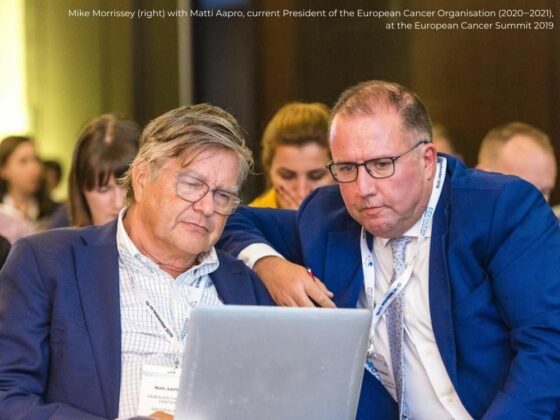Loneliness among middle-aged men is associated with increased risks of developing cancer. The longitudinal Finnish study, published in the May issue of Psychiatry Research, additionally found mortality was higher among male cancer patients who were unmarried, widowed or divorced than those in relationships.
“Our results underline the findings of the earlier studies that loneliness should be considered as a major risk factor for many diseases, including cancer,” Siiri-Liisi Kraav, a social science investigator from the University of Eastern Finland, told Cancer World.
Loneliness and social isolation have been claimed to affect physical health as strongly as some more widely known health risks, such as smoking or obesity. However, while there is an abundance of research on many common cancer risk factors, less is known about loneliness and social isolation. In the current paper, the authors highlight subtle differences between loneliness and social isolation, with social isolation referring to an objective lack of social contacts, while loneliness refers to negative perceptions of social isolation, i.e. subjective feelings of being lonely. “Perceptions of loneliness are to do with how satisfied people feel with number of relationships and depths of relationships. People can feel lonely no matter how many friends they have,” explains Kraav.
For the study, Kraav, and colleagues, assessed baseline levels of loneliness, social isolation and health-related factors for 2,570 men aged between 42 and 61 years when recruited to the Kuopio Ischaemic Heart Disease Risk Factor (KIHD) study between 1984 and 1989. “The study originally set out to explore effects of baseline variables, such as diet and socioeconomic background, on heart disease. But investigators also recorded data on different psychological variables and relationships, which has provided an extraordinary data resource allowing us to retrospectively reconstruct loneliness and social isolation scores for participants,” explains Kraav. The analysis was enabled by the Finnish system where every resident has a personal identification number, allowing investigators to link baseline study data to the Finnish National Cancer Registry.
For the study, an 11-item Loneliness Scale was used to measure subjective satisfaction with the participant’s social life, feelings of loneliness and perceived discrepancies between desired and actual social contacts. Social isolation was measured on a 10-point scale that objectively measured the amount and frequency of the different social contacts individuals had. The investigators evaluated links between cancer incidence, loneliness and social isolation, using Cox proportional hazards analysis, and used Kaplan-Meier to assess the impact of relationship status on cancer mortality.
Results show that, during a mean follow-up of 20.4 years, 649 participants were diagnosed with cancer (25.3%), including 236 (9.2%) with prostate cancer, 87 (3.4%) with lung cancer, and 79 (3.1%) with colorectal cancer. Altogether 283 participants (11%) died as a result of their cancer.
Men who were judged to be lonely at baseline had a 10% greater risk of developing cancer during follow-up than men not judged to be lonely (P=0.009), with the link preserved after adjustments were made for lifestyle and health-related co variates. The team also observed an association between social isolation and total cancer incidence, although this association was not maintained after adjusting for lifestyle, diet or depression scores. When exploring specific cancers, the study did not find a connection between colorectal cancer and prostate cancer incidence, but did find a connection between loneliness and lung cancer, although this was lost when the team adjusted for depression at baseline. The team also tested the effect of relationship status on cancer mortality among men diagnosed with cancer, and found those who were single, divorced, or widowed at baseline died earlier than those who were married or living with a partner, at an average of 21.5 versus 23.4 years from baseline (P=0.003).
Commenting on the results, Kraav says that it is likely that different mechanisms linked to the development of different cancers explain why loneliness influenced lung cancer but not prostate or colorectal cancers. The mechanism behind the overall effect of loneliness on cancer, she adds, is unclear, although one possibility is that loneliness may disturb functions of the hypothalamic-pituitary-adrenal axis, and increase low-grade inflammation either directly or via unhealthy lifestyle or depression. “We think that a variety of different things are happening in lonely men that added together increase their risk of developing cancer,” says Kraav.
Regarding the link between relationships and cancer mortality, there are two hypotheses, she explains. “One is that men in relationships get diagnosed earlier because they go to the doctor sooner, and the other is that they are more likely to persist with treatments.”
On the basis of the results, Kraav feels that the time is right for people to be screened for loneliness when they undergo routine health checks. “It can be as simple as asking one question – do you feel lonely? If the answer is yes, they could be asked to complete a validated questionnaire.”
The study indicates the need to develop targeted interventions for people who feel lonely regardless of their social network. But what to offer them is not so clear. “If people are found to be lonely, they could be offered psychological support to learn social skills to overcome their loneliness. But as a society we need to have increased awareness of the dangers of loneliness and develop an infrastructure with places where lonely people can go to be supported,” says Kraav.












